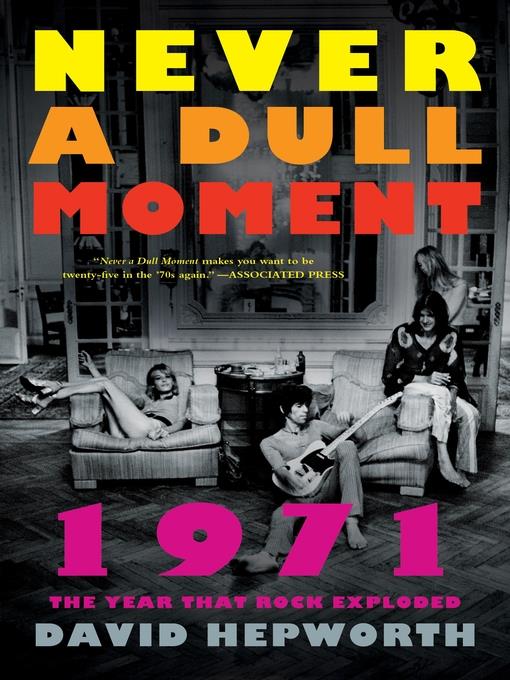
Never a Dull Moment
1971 The Year That Rock Exploded
کتاب های مرتبط
- اطلاعات
- نقد و بررسی
- دیدگاه کاربران
نقد و بررسی

March 14, 2016
Music writer and broadcaster Hepworth prefaces his fascinating cultural history with a brash declaration: in 1971, "a huge proportion of the most memorable albums ever made were released." This extravagant claim underscores the scope of Hepworth's ambition; and he's so entertaining and erudite that one almost believes him. Hepworth opens with Paul McCartney initiating Beatles "divorce" proceedings on New Year's Eve and ends the following December with the first rock star, Elvis Presley, considered old at 36 and facing an actual divorce, blazing a nostalgia trail that other rock gods would follow. Between these two monuments, a parade of iconic figuresâDavid Bowie, Led Zeppelin, Sly Stone, Big Star, Marvin Gayeâdisplay the creative ferment of the moment. Hepworth's subtitle is a misnomer, as he addresses many genres of popular music. Vivid, irreverent prose and analytic insight distinguish the book from the legion of Boomer nostalgia titles. Alongside the requisite gossip, Hepworth's magisterial overview notes the exploitation of nostalgia, the rise of the singer/songwriter, the elevation of rock stars into louche aristocrats, and the transformation of FM radio to an album-oriented rock format. Hepworth also details the openness of record labels to new talent and experimental recording techniques that laid the groundwork for punk, indie, and electronica.

April 15, 2016
The longtime music journalist and founder of Mojo and Q delivers a month-by-month breakdown of the year that changed pop music history.On New Year's Eve 1970, Paul McCartney issued a writ of dissolution for the Beatles in Britain's High Court. The anecdote, recalled by Hepworth (The Secret History of Entertainment, 2004) in the opening of his entertaining exploration of the year in music that was 1971, is a tidy reference to the changing moods in popular music and culture. "The sixties ended that day," he writes. "You might say this was the last day of the pop era." As a new era dawned, the potential for artists seemed limitless. Album-oriented rock was replacing the single-driven pop machine, allowing a wider range of artists to express themselves in unique and creative ways. In retrospect, it might seem easy to gloss over just how radical the musical landscape of 1971 was and how many disparate artists were releasing music and becoming superstars, which itself was a new phenomenon that was turning singers into de facto royalty--a fact epitomized by the wedding of Mick and Bianca Jagger. Hepworth tracks the changes that created this new environment, including a changing industry marketplace, new technological developments such as the synthesizer, and a rising generation of new listeners. The author painstakingly recounts the album releases, Top of the Pops performances, and endless touring dates that defined the year. Attempting to list the artists who dominated album charts, media, and collective consciousness of the year only proves the embarrassment of riches at Hepworth's disposal: the Rolling Stones, Rod Stewart, Led Zeppelin, Carly Simon, Marvin Gaye, the Who, Sly Stone, and Carole King, to name just a few. The author's chronicle of the year is loaded with gossipy anecdotes, adroit criticism, and earnest affection for the musicians, record executives, and technicians who defined it. An exuberant tour through a pivotal year in the development of popular music and culture.
COPYRIGHT(2016) Kirkus Reviews, ALL RIGHTS RESERVED.

May 1, 2016
Journalist and author Hepworth's (The Secret History of Entertainment) entertaining and enlightening book illustrates his theory that the year was one of the most substantial and influential in rock, and that it also marked the true beginning of the Seventies, a decade renowned for blockbuster albums, expanding genres, and rock glamour and excess. The year saw the release of such classics as Carole King's Tapestry, the Rolling Stones's Sticky Fingers, Who's Next from the Who, and albums from Marvin Gaye, Sly Stone, and Joni Mitchell, among others. Moving chronologically, Hepworth documents the creation of many of these seminal works while examining the times and mood in popular culture, along with the trajectory and lives of the artists responsible for the shifts, concluding with a discussion of rock nostalgia. The author's thought-provoking and diligently researched synthesis of criticism, pop culture, history, and commentary will appeal to rock music fans of all ages, whether they lived through 1971 or are discovering its musical riches and influences 45 years later. VERDICT Recommended for all public libraries with pop culture and rock music collections.--James Collins, Morristown-Morris Twp. P.L., NJ
Copyright 2016 Library Journal, LLC Used with permission.

May 15, 2016
For rock fans, it didn't get much better than 1971so asserts music journalist Hepworth. That year offered a surge of creativity, playfulness, ambition, technological breakthrough, ego, and blissful ignorance as well as some of the most memorable albums ever made. To set the context, he describes the cultural highlights and trends of each month, along with major releases, from Carole King's iconic Tapestry to Don McLean's epic single, American Pie. But he also discusses idiosyncratic releases that have gained traction over the years, such as the English singer-songwriter Nick Drake's oddly named album Bryter Layter, now considered a classic of its genre. All the big names of the 1970s are represented here: Springsteen, Bowie, Led Zeppelin, Marvin Gaye, the Rolling Stones, Cat Stevens, Rod Stewart, the ex-Beatles, Neil Young, and Elton John. As Hepworth notes, many of the musicians who made a splash in 1971 are still playing today, and in bigger venues. Indeed, he maintains that the music of 1971 is in everyone's bloodstream. A must for rock fans.(Reprinted with permission of Booklist, copyright 2016, American Library Association.)

























دیدگاه کاربران